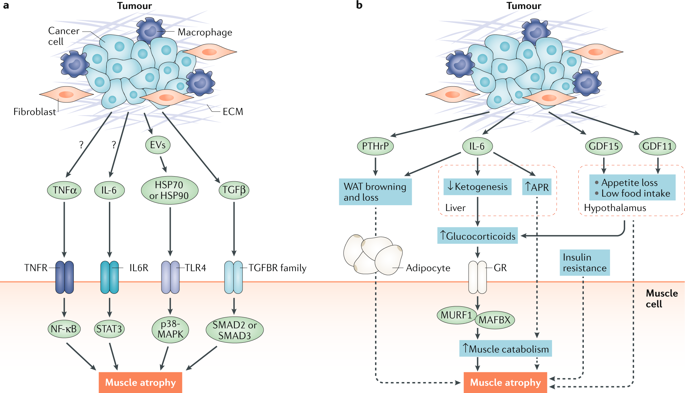当前位置:
X-MOL 学术
›
Nat. Rev. Cancer
›
论文详情
Our official English website, www.x-mol.net, welcomes your feedback! (Note: you will need to create a separate account there.)
Understanding cachexia in the context of metastatic progression.
Nature Reviews Cancer ( IF 78.5 ) Pub Date : 2020-03-31 , DOI: 10.1038/s41568-020-0251-4 Anup K Biswas 1 , Swarnali Acharyya 1, 2, 3
Nature Reviews Cancer ( IF 78.5 ) Pub Date : 2020-03-31 , DOI: 10.1038/s41568-020-0251-4 Anup K Biswas 1 , Swarnali Acharyya 1, 2, 3
Affiliation

|
Tumours reprogram host physiology, metabolism and immune responses during cancer progression. The release of soluble factors, exosomes and metabolites from tumours leads to systemic changes in distant organs, where cancer cells metastasize and grow. These tumour-derived circulating factors also profoundly impact tissues that are rarely inhabited by metastatic cancer cells such as skeletal muscle and adipose tissue. In fact, the majority of patients with metastatic cancer develop a debilitating muscle-wasting syndrome, known as cachexia, that is associated with decreased tolerance to antineoplastic therapy, poor prognosis and accelerated death, with no approved treatments. In this Perspective, we discuss the development of cachexia in the context of metastatic progression. We briefly discuss how circulating factors either directly or indirectly promote cachexia development and examine how signals from the metastatic process can trigger and amplify this process. Finally, we highlight promising therapeutic opportunities for targeting cachexia in the context of metastatic cancers.
中文翻译:

在转移过程中了解恶病质。
肿瘤在癌症发展过程中会重新编程宿主生理,新陈代谢和免疫反应。肿瘤中可溶性因子,外泌体和代谢物的释放导致远处器官发生全身性变化,癌细胞在该处转移并生长。这些源自肿瘤的循环因子也深刻地影响了很少被转移性癌细胞占据的组织,例如骨骼肌和脂肪组织。事实上,大多数转移性癌症患者会出现虚弱的肌肉萎缩综合征,即恶病质,与抗肿瘤治疗的耐受性降低,预后差和死亡加速有关,而没有经过批准的治疗方法。在此观点中,我们讨论了在转移进程中恶病质的发展。我们简要讨论了循环因素如何直接或间接促进恶病质发展,并探讨转移过程中的信号如何触发和放大这一过程。最后,我们重点介绍了在转移性癌症中靶向恶病质的有前途的治疗机会。
更新日期:2020-03-31
中文翻译:

在转移过程中了解恶病质。
肿瘤在癌症发展过程中会重新编程宿主生理,新陈代谢和免疫反应。肿瘤中可溶性因子,外泌体和代谢物的释放导致远处器官发生全身性变化,癌细胞在该处转移并生长。这些源自肿瘤的循环因子也深刻地影响了很少被转移性癌细胞占据的组织,例如骨骼肌和脂肪组织。事实上,大多数转移性癌症患者会出现虚弱的肌肉萎缩综合征,即恶病质,与抗肿瘤治疗的耐受性降低,预后差和死亡加速有关,而没有经过批准的治疗方法。在此观点中,我们讨论了在转移进程中恶病质的发展。我们简要讨论了循环因素如何直接或间接促进恶病质发展,并探讨转移过程中的信号如何触发和放大这一过程。最后,我们重点介绍了在转移性癌症中靶向恶病质的有前途的治疗机会。



























 京公网安备 11010802027423号
京公网安备 11010802027423号